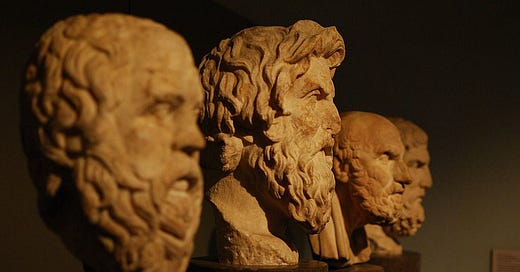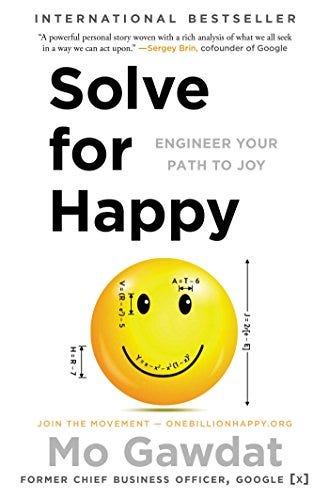Lessons From Ancient Philosophers That Will Help You Navigate Life
The enduring value of philosophical reasoning.
“Everything flows, and nothing abides, everything gives way, and nothing stays fixed.” — Heraclitus
In uncertain times, looking to past wisdom for guidance can be helpful.
Ancient philosophers like the Stoics offered valuable perspectives and advice that can be applied today. One such concept is amor fati, or “love of fate.” Rather than feeling defeated by hardships, the Stoics encouraged embracing them as opportunities for growth.
Pythagoras’s view on suffering teaches us to use our pain to become stronger individuals rather than getting stuck in self-pity. And Socrates’ philosophy reminds us that regardless of our circumstances, we are always responsible for how we choose to react and shape our lives.
From the Stoics’ teachings on acceptance and resilience to Parmenides’s wise advice to “know thyself,” ancient wisdom can help guide us through uncertain times.
By turning to these teachings and reflecting on how we face challenges, we can gain valuable perspective and direction for navigating our lives.
And who knows? We may find solace in Aristotle’s musings on happiness and the pursuit of eudaimonia.
Philosophy is a discipline that has been around for thousands of years. It is the study of knowledge and how it relates to the world. It is the pursuit of answers via logic and reasoning. Philosophy can be used to examine our daily lives, our society, and ourselves.
Philosophers use various methods in their work — they may use qualitative research, quantitative research, or even observation to explore a philosophical question.
Philosophers are also interested in studying and understanding human nature. They want to discover what makes people tick and why we do what we do.
“Know how to listen and you will profit even from those who talk badly.” — Plutarch
Pythagoras’ Theory of the Universe
One of the most influential and revered philosophers in history is Pythagoras. He is best known for his contributions to mathematics and philosophy, including his groundbreaking theory on the structure and workings of the universe.
Pythagoras is considered the father of modern science and mathematics.
Pythagoras believed that everything in the universe was governed by specific mathematical principles, with numbers as its foundation.
This idea continues to influence modern thought about physics, astronomy, and other natural sciences.
Despite being over 2,500 years old, Pythagoras’s theories still provide valuable insight into the nature of our world.
Whether we are exploring concepts of space and time or conquering discoveries in science and technology, Pythagorean thinking can help us better understand how everything in the universe is connected.
Aristotle’s Wisdom
Regarding philosophy and its impact on our lives, no philosopher is more renowned than Aristotle.
Throughout his work, Aristotle explores a wide range of topics related to human nature, such as happiness, virtue, ethics, and justice.
One of the most important lessons we can learn from Aristotle is the importance of philosophical reasoning in our daily lives.
Whether we are making decisions about our careers or relationships or even navigating through everyday life, reflection and critical thinking are essential.
By examining the various factors involved in our choices and actions — including their consequences — we can gain a deeper understanding of ourselves and what drives us. This ability to reflect on our thoughts and behaviors can help us live more meaningful, fulfilling lives.
Eudaimonia: The Pursuit of Happiness
One of the most important philosophies that Aristotle introduced was his idea of eudaimonia — or the pursuit of happiness.
For Aristotle, true happiness could only be achieved by living a virtuous life — acting in ways that reflected our highest ideals and values.
This concept has been embraced throughout history and continues to influence our understanding of living a good life today. And despite changing times and shifting societal norms, pursuing eudaimonia remains central to our pursuit of happiness.
Eudaimonia means something different to everyone, but the ultimate goal remains the same: to live a meaningful and fulfilling life. Eudaimonia comes from the Greek words eu and daimon, meaning “good spirit.” And while many people today may associate this term with earthly pleasures or material wealth, it is much more than that.
For Aristotle, eudaimonia was about finding purpose by achieving personal excellence and striving to be our best selves. By focusing on what truly matters — such as our relationships or contributions to the world — we can gain a deeper understanding of ourselves and learn to appreciate all life offers.
By embracing his ideas about virtue and ethics, we can learn to pursue happiness and fulfillment no matter our obstacles.
Socrates’ Legacy to Western Philosophy
The Greek philosopher Socrates is considered one of the most influential thinkers in Western philosophy.
His ideas and teachings, often referred to as Socratic questioning or the Socratic method, continue to shape how we think about topics like ethics, morality, and the nature of knowledge.
One of Socrates’ key contributions was his belief that truth was something beyond the physical world — he believed that there were ideal forms or archetypes behind every object, idea, and action.
This concept became known as Plato’s theory of ideal forms and has been foundational in many philosophical movements throughout history.
Socrates also emphasized the importance of critical thinking and rational inquiry — he encouraged people to question their own beliefs and examine their assumptions to achieve a deeper understanding of the world around them.
Plato’s Theory of Ideal Forms
Plato was intrigued by Socrates’ belief that truth transcended the physical world — he believed that there was an ideal form or archetype behind every object, idea, and action. Many of Socrates’ teachings were adopted by Plato, including his theory of ideal forms.
According to this theory, there are ideal forms or paradigms behind everything we see and experience in the physical world — from objects and actions to concepts like truth and beauty.
This concept has profoundly impacted many areas of Western philosophy, influencing thinkers ranging from Aristotle to René Descartes to Immanuel Kant. And it continues to shape how we think about topics like morality, knowledge, and the nature of reality.
And despite being over 2,000 years old, Plato’s ideas about ideal forms resonate with us today and drive us to seek out knowledge and truth wherever it may be found.
Parmenides’s Bold Ideas
One of the most influential philosophers in history is Parmenides. He was best known for his bold ideas about truth, reality, and existence, which continue to influence our thinking today.
Parmenides believed that everything in the universe was governed by one overarching truth — or logos — which maintained order throughout all creation. This philosophy has influenced many other schools of thought over the centuries, including those that challenge it.
Above all else, Parmenides’s work reminds us of the importance of questioning what we think we know and seeking deeper truths about the world around us. Whether we are exploring new scientific discoveries or encountering challenges in our personal lives, his philosophy can help guide us on our journey toward greater understanding.
Socrates, Plato, and Parmenides are a few great philosophers whose work resonates with us today.
Their ideas about truth, reality, and existence continue to shape our thinking and help us make sense of an ever-changing world.
In an age where information is bombarding us from all directions, it’s more important than ever to stay curious and open-minded — which can only be achieved through philosophical reasoning.
Let us embrace this time-honored tradition and continue to engage with philosophical ideas and theories — they may hold the key to understanding ourselves and navigating the complexities of life.
© BELUMA, LLC t/a Beyond Two Cents. All Rights Reserved.
DID YOU KNOW?
The ancient philosopher Diogenes once delivered Plato a plucked chicken and called it a “man.”
Dating back to 385 BCE, Plato’s Academy would go on to establish one of the first institutions of higher learning in history.
Archimedes is said to have discovered how to measure the buoyancy of an object while butt-naked.
BOOK OF THE WEEK
I'll be recommending you a new book every week!
For this week's recommendation, I would suggest reading "Solve for Happy" by Mo Gawdat. (former Chief Business Officer of Google X)
This book explores the concept of happiness from a scientific and philosophical perspective and offers practical advice for finding joy and contentment in our everyday lives.
Whether you're looking for new insights about yourself or want some inspiration to explore the meaning of life, "Solve for Happy" is a must-read that will help you find greater fulfillment in everything you do.
Give it a try. I'm sure you won't be disappointed!
(There are no affiliate links in Beyond Two Cents, and I have no financial gain from you reading these books.)







